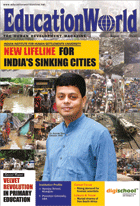 The proposed indian Institute for Human Settlements (IIHS) University is better late than never (EW August). Our cities and towns are rapidly becoming hellholes of squalor and filth. The untrained clerks and engineers who staff the municipal corporations and are entrusted with the duty of managing our cities have no clue about the basic rules of urban planning and manage-ment. Corruption is rife and there’s a glaring lack of professional skills.
The proposed indian Institute for Human Settlements (IIHS) University is better late than never (EW August). Our cities and towns are rapidly becoming hellholes of squalor and filth. The untrained clerks and engineers who staff the municipal corporations and are entrusted with the duty of managing our cities have no clue about the basic rules of urban planning and manage-ment. Corruption is rife and there’s a glaring lack of professional skills.
However I am sceptical about IIHS University graduates opting to work with the government-run public works department or municipal corporations. There’s a real danger that they will opt for high-paying jobs in the private sector where work conditions are better.
Arjun Malhotra
Delhi
Model success story
Your special report feature on the activity-based learning (ABL) revolution in Tamil Nadu’s government primaries was a refreshing read (EW August). It was uplifting and heartening to learn that such large-scale pedagogical reform is possible in government schools. M.P. Vijayakumar is a visionary bureaucrat, who must be congratulated for his single-minded dedication.
The success of ABL in Tamil Nadu proves that committed bureaucrats can influence and persuade politicians to adopt and implement radical education policies in government schools. Moreover, it’s quite remarkable how the state’s strongly unionised teachers’ community was won over. Tamil Nadu’s ABL model should be replicated in all government schools countrywide.
Divya Rangarajan
Bangalore
Faulty education system
Re your editorial ‘Higher education capacity creation failure’ (EW July), the 100 percent admission cut-off stipulated by the prestigious Shri Ram College of Commerce may seem bizarre. But admissions statistics prove there was nothing wrong in stipulating this maxi-mum cut-off as on the first day of admission, only 18 of 255 seats were vacant. Therefore the college authorities were justi-fied in setting this high cut-off.
Actually, a faulty education system cou-pled with a severe shor-tage of good colleges is responsible for this bizarre situation. Adm-ission into a reputed college is always a rejection procedure — the manag-ement’s goal is to exclude as many applicants as possible. Moreover there is rampant grades awarding inflation by school examination boards. I wonder how 100 percent marks are awarded by examiners in subjects such as English and history. Does it mean students write/reproduce answers verbatim from textbooks?
Mahesh Kapasi
Delhi
Severe misrepresentation
I am a retired professor of English (National College, Tiruchi), secretary of the Consumer Protection Council, Tamil Nadu and a freelance journalist. I wish to bring to your attention repeated misrepresentations of R. Sethuraman, vice chancellor of SASTRA Deemed University, Thanjavur, who is frequently quoted in EducationWorld. Quite obviously, your advertising department must have recommended him since he must have given heavy ads. These are the facts about him:
• Sethuraman was working as a clerk in Indian Overseas Bank, Saidapet, Chennai in the 1970s. An enquiry was instituted against him but due to the influence of Congress party leader G.K. Moopanar, he was allowed to resign from the bank.
• His SASTRA Deemed University is given AA ranking by the Tamil Nadu state government, but is not accredited by any national agency. For your information AA ranking is less prestigious than AA+, AAA, and AAA+.
• Sethuraman is not entitled to refer to himself as ‘professor’ because he has a mere bachelor of science degree. He must have bought his doctorate from somewhere because I’ve noted that you often refer to him as “Dr. Sethuraman”. Please ask him where he acquired his doctorate.
• The Consumer Protection Council, Tamil Nadu, of which I am the secretary, has won six cases against SASTRA Deemed University for refusing to return the tuition fees of students wanting to leave the university. This is a violation of the Union HRD ministry and Univer-sity Grants Commission norms. The Madras high court has described SASTRA’s practice of withholding the original certificates of students as “blackmail”. Currently three cases against this university are being heard by the Thanjavur District Consumer Forum.
There is a lot more about this gentleman. Please for heaven’s sake remove the generous write-up given to him in your story ‘50 leaders redefining Indian education’ archived in your website.
S. Pushpavanam
Secretary, Consumer Protection Council, Tamil Nadu, Tiruchirappalli
We have never featured any advertising of SASTRA Deemed University — Editor
Textbooks mockery
Through your popular magazine I want to express my concern about the falling standards of our textbooks and teaching — two of the many problems which dog our education system.
Books are students’ 24/7 or ‘always on’ teachers. Texts, especially of science, should be accurate and encourage the spirit of enquiry and reasoning. Admittedly in most books, some typographical and language errors are inevitable. But factually inaccurate science textbooks and teachers who follow them without correction are an altogether different proposition.
For instance the Karnataka state board’s prescribed second year pre-university (class XII) maths textbook is replete with errors. In most classrooms, teachers don’t correct patent textbook errors, making a mockery of the logical and deductive reasoning of mathe-matics. All efforts to make them see reason are met with nonsensical arguments and escapism. With this state of affairs, how can we dream of a stronger and better India?
Sanam Saraswathi
Bangalore